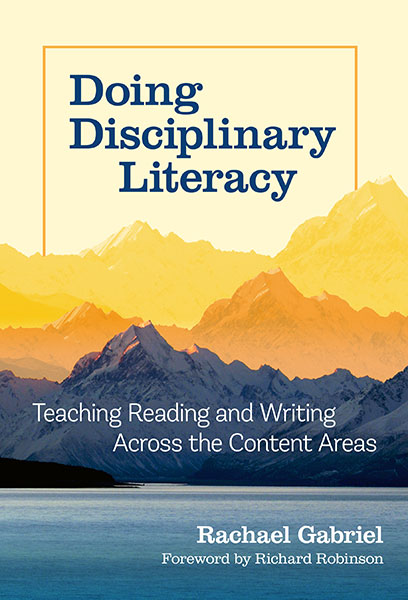Professors: Request an Exam Copy
Print copies available for US orders only. For orders outside the US, see our international distributors.
Foreword by: Richard Robinson
Publication Date: July 28, 2023
Pages: 160

Learn how to design discipline-specific literacy instruction that increases academic engagement and supports college and career readiness. This practical resource offers contexts and strategies for addressing a fundamental question that teachers bring to their work with middle and high school learners: How do I support literacy development alongside specific content goals? By exploring the histories and potentials of discipline-specific literacy instruction, this book provides a clear framework for engaging students as active participants in the authentic activities and processes of each content area. It goes beyond content-area reading strategies by situating literacy within the purposes, audiences, and formats of each area of study. Readers are invited to develop their own disciplinary knowledge to ensure authenticity in their representations of literate practices, to involve students deeply in the work of their disciplinary communities, and to support students’ continued engagement beyond the classroom.
Book Features:
Rachael Gabriel is a professor of literacy education in the Neag School of Education at the University of Connecticut.
“The accessible content and format, in addition to the application exercises and discussion questions, make Doing Disciplinary Literacy an effective starting point for those interested in integrating disciplinary literacy into instruction whether independently, through a professional development session, or in a content area literacy education course.
—Teachers College Record
“Gabriel (Univ. of Connecticut) supplies secondary-education graduate students with a degree of meta-discursive awareness to enable them to function in the classroom with the changing demands of reading, writing, and communication. The conclusion provides a good summary of the implications of disciplinary literacy.”
—CHOICE
“Rachael Gabriel’s writing reminds you of that trusted teacher friend who is both incredibly sharp and unfailingly humble, allowing you to be vulnerable and learn more from her than anyone else. She’s a teacher’s teacher, using carefully crafted metaphors throughout this book to provide access to complex ideas....This book is not only an introduction to disciplinary literacy, it's your introduction to Rachael—an invitation to engage with the community of scholars who orient to disciplinary literacy as a liberatory practice not only for students, but for their teachers too.”
—From the Foreword by Richard Robinson, The Citadel - The Military College of South Carolina
“This book promises to be a useful guide for content area teachers interested in incorporating literacy into their classrooms in appropriate ways, given the content and context of the field in which they teach. It reflects a deep understanding of what it means to engage students fully into processes of the disciplines.”
—Cynthia Shanahan, professor emerita, University of Illinois Chicago
Contents
Foreword ix
Acknowledgments xiii
Introduction 1
Overview 3
Conclusion 4
1. What Is Disciplinary Literacy? 5
Why Build Disciplinary Literacy? 6
Questions for Discussion 15
2. Pedagogy and Processes for Literacy Development 17
Pedagogy 18
Doing the Work of the Discipline 19
Processes for Literacy Development 23
Understanding Text Complexity 25
What Does the Reading Sound Like? 29
Questions for Discussion 32
Resources for Further Reading 32
3. Doing the Discipline 35
Routines and Practices 36
Habits of Mind 37
Conventions 40
Known Differences 41
History and Literature 42
Mathematics 42
Why Disciplines Are Not Enough 45
Discourse Follows Communities 47
Resources for Further Reading 47
4. Text Roundup 49
Examining Routines 49
Unlocking Habits of Mind 52
Activity Guide: Text Roundup 54
Evaluation 56
Questions for Discussion 57
Resources for Further Reading 58
5. Mentor Texts 59
Knowing What to Notice 60
Knowing What to Teach 62
How to Write From a Mentor Text 63
Activity Guide 66
Evaluation 67
Questions for Discussion 67
Resources for Further Reading 67
6. The Expert Interview 69
Purposes for Expert Interviews 70
Interview Procedures 71
Interview With a Lab Technician in a Biology Lab 74
Evaluation 76
Questions for Discussion 76
Resources for Further Reading 77
7. The Oak Tree Activity 79
A “Fine” Example 81
Activity Guide 84
Examples 84
Evaluation 89
Questions for Discussion 89
Resources for Further Reading 89
8. Text Set Construction 91
Making a Text Set 93
Activity Guide 94
Evaluation 95
Questions for Discussion 96
Resources for Further Reading 96
9. Text-Dependent Questions 99
A Directed Reading-Thinking Activity 100
Activity Guide 102
Evaluation 105
Questions for Discussion 105
Resources for Further Reading 105
10. Learning From Nontraditional and Non-Print-Based Texts 107
Hierarchies of Representation 108
Teaching the Reading of Non-Print-Based Texts 110
Activity Guide 112
Evaluation 112
Questions for Discussion 113
Resources for Further Reading 113
11. Task Analysis and Enhancement 115
Starting With a Pre-Planned Lesson or Activity 115
Starting With a Text 117
Knowing Where Literate Practices Go 118
Purpose and Process 118
Activity Guide 119
Evaluation 119
Questions for Discussion 120
Resources for Further Reading 120
Conclusion 121
Preparing Students for the Work of Their Lives 123
Looking Ahead 124
References 127
Index 135
About the Author 139
Professors: Request an Exam Copy
Print copies available for US orders only. For orders outside the US, see our international distributors.